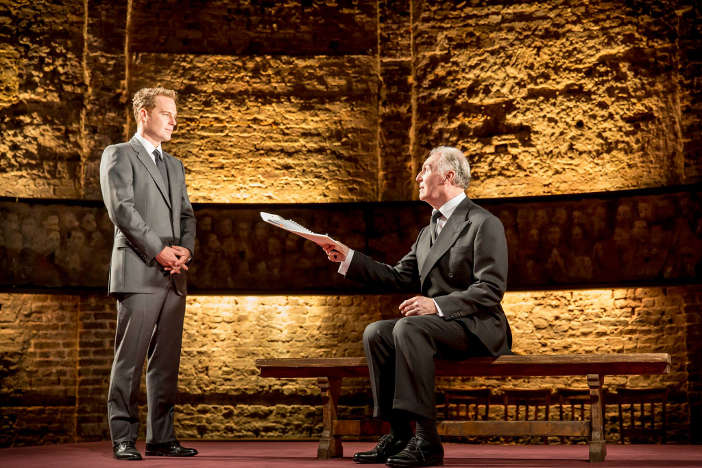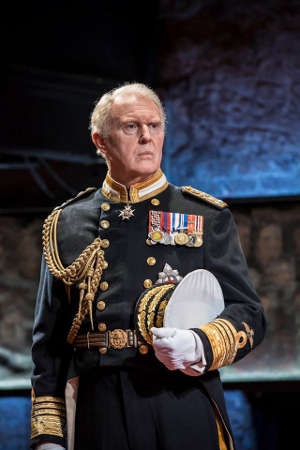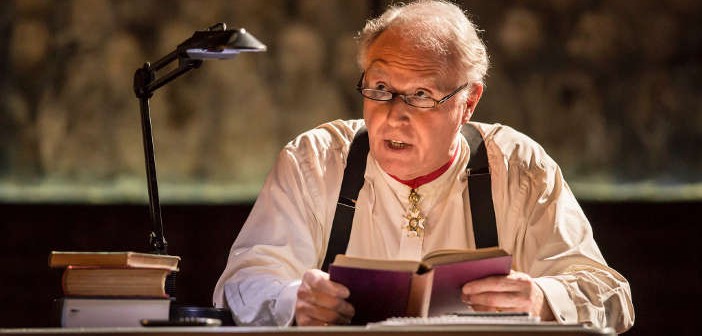Occasionally, in my idler moments, I’m inclined to lament the state of British literature. Playwriting, in particular, seems filled either with technocrats preoccupied with purity of style, or chumps and bozos churning out pap to make a quick buck. No one ever wants to say anything anymore; and even when they do it’s so watered down and processed that it dulls one’s brain into a vegetative acceptance of mundanity. But, every so often, a play comes around that gives you hope once more that there are still great writers out there. Last year the play that did that for me was the Almeida’s production of Lucy Kirkwood’s Chimerica. This year, it seems that the Almeida have done it again with Mike Bartlett’s fantastic new play King Charles III.
Billed as a “future-history play” it is a piercing satire of the Monarchy, politics, modern writing, and society itself, beginning with the funeral of our present monarch, and speculating as to the decisions and actions of the future King – Prince Charles. We watch, enthralled, as Charles, whose ‘life has been a ling’ring for the throne’ finally seizes his power, before readily proceeding to utilize it. Parliament has just passed a bill that seeks to limit the powers of the press. Charles, as King, now must grant royal assent. Yet, believing a free press to be intrinsic to Britain and the British democracy Charles denies this assent and petitions Parliament to reconsider their decision.

The irony – that an unelected Monarch is calling to account the democratically elected Parliament on a measure that undermines democracy in the country – is both at once hilarious, and tragic. Charles’ hubris is simply that he wants to do the right thing for democracy. The problem is, his position as an undemocratic figure prevents him from standing up for what is right.
The tragedy of Charles’ impotence is elucidated totally at the end. What Charles stands for, in his commitment to a free press, is a Utopianism that cannot exist in modern Britain. The current Queen stands for stability, she does not challenge the status quo, but simply rides the times as if she were balancing on a surfboard. Charles, on the other hand, has opinions and values. What Bartlett highlights in this enthralling drama, is that change is not wanted in the Britain of today – it is a tragic and melancholy irony that it is a Monarch who demonstrates this.
 Written in blank verse the play further underlines its tragic notes with its Shakespearean allusions, in its metaphor, metre, imagery, and narrative. The ghost of Diana calls to mind Banquo’s ghost in Macbeth, while a scheming Duchess of Cambridge is suggestive of King Lear’s daughters. The verse itself is exceptionally well-constructed; it heightens the passions, concentrates the tensions, thickens the intrigue, and deepens the laughter. Although much of this added intensity arises from the play’s knowing manipulation of The Bard, Bartlett’s writing is still, nonetheless, very modern. In fact, the writing is so sharp, and indeed, unquestionably poetic, that it becomes very easy to comprehend the fascination and attraction of verse drama in general.
Written in blank verse the play further underlines its tragic notes with its Shakespearean allusions, in its metaphor, metre, imagery, and narrative. The ghost of Diana calls to mind Banquo’s ghost in Macbeth, while a scheming Duchess of Cambridge is suggestive of King Lear’s daughters. The verse itself is exceptionally well-constructed; it heightens the passions, concentrates the tensions, thickens the intrigue, and deepens the laughter. Although much of this added intensity arises from the play’s knowing manipulation of The Bard, Bartlett’s writing is still, nonetheless, very modern. In fact, the writing is so sharp, and indeed, unquestionably poetic, that it becomes very easy to comprehend the fascination and attraction of verse drama in general.
Rupert Goold’s direction accentuates the tragi-comedy of Barlett’s text. The stark set design and Jocelyn Pook’s sombre music achieve a sublime balancing act of the play’s sincerity and hilarity. On the one hand it is reminiscent of those modern RSC interpretations of Shakespeare, with dark, hooded figures earnestly bellowing plainchant; while on the other it seems fresh and invigorating, with the music intensifying the tension of the on-stage drama.
Tim Piggott-Smith is exceptional as King Charles. He renders the part with profundity and consequence – bringing a very Shakespearean quality, which highlights similarities between Charles and Hamlet, Macbeth and King Lear. The cast as a whole is excellent, particularly Lydia Wilson as Kate. King Charles III is clearly set to be one of the best new plays of this year. I wholeheartedly recommend you see it before it sells out.
King Charles III at the Almeida Theatre until Saturday 31st May 2014. Running time approximately 2 hours and 45 minutes including an interval. For more information and tickets visit the website.




